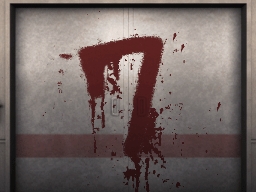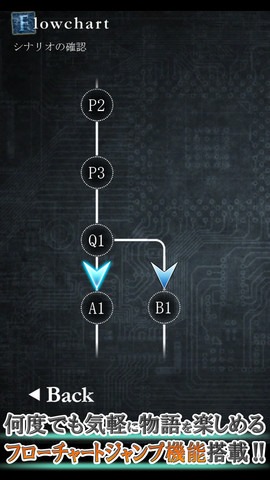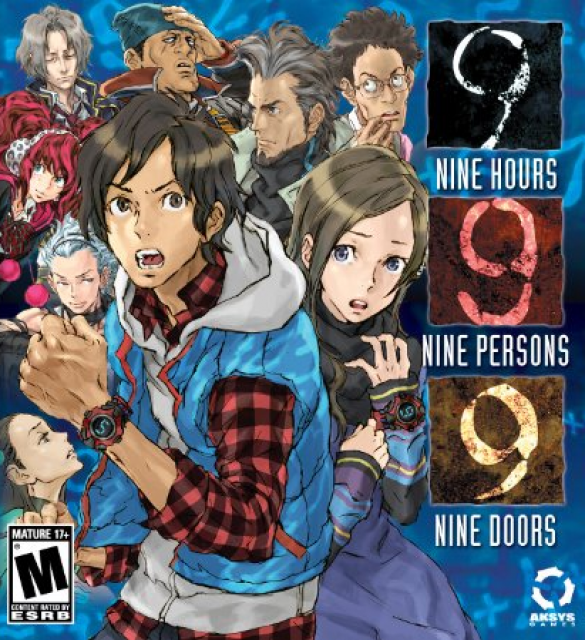Overview
Nine Hours, Nine Persons, Nine Doors (999 for short) is a visual novel / adventure game developed by Chunsoft for the Nintendo DS that was published by Spike in 2009 for Japan and by Aksys Games in 2010 for the United States. 999 is the first game in the Zero Escape series, and has a sequel, Zero Escape: Virtue's Last Reward. In 2013 an iOS version of 999 was released in Japan and later in western territories in 2014 that removed the "escape the room" sections for people to focus on the story. Also included in the mobile re-imagining were higher quality sound and visuals.
Story

A college student named Junpei is "invited" to play a game called the Nonary Game. The person in charge of this game is a person wearing a gas mask, who calls themselves Zero. The game takes place on an old cruise ship. There are 9 people playing the Nonary Game, and they have to pass through numbered doors to get to the exit, marked with a 9. The time limit is 9 hours, after which the ship sinks.
If the players do not follow the rules and conditions of the game, they also risk death from a small ingested explosive. Forced to cooperate to progress through the game, the "players" discover their connections and shared history.
Gameplay

This is an adventure game that plays out like a horror novel. 999 is extremely story intensive, but there are some different gameplay types for progression. The player will have to solve up to 32 puzzles and make decisions that decide whether Junpei and his fellow captives will be successful. There are a variety of puzzle types in the game, but most are based on logical thinking. The objective of every puzzle is to escape from the room Junpei is currently in.
There are also life simulation elements that will have Junpei building relationships with other players of the Nonary Game. Choices he makes in these dialogues affect how will the game play out. The game cannot be completed in only one playthrough, as the player will have to gather information from the bad endings in order to make the right decisions. In total, there are 6 endings, of which only one is the true ending.
Bracelets & Numbered Doors

Each of the nine players is equipped with an nondetachable bracelet, with numbers from 1 to 9 respectably. To pass through the numbered doors, the players have to match the digital root of a door. The digital root is calculated by summing the numbers on the bracelet, and then summing the digits of the calculated number until the final number consists of a single digit. For example, the digital root of these numbers is the following: 2+6+7+8 = 23 -> 2+3 = 5. That means that the players with the numbers 2, 6, 7, and 8 will be able to pass through a door with number 5 on it. However, only 3 to 5 people can pass through a numbered door, and all bracelets used to enter a door have to be verified once more after passing through the door. When the door is being used, the rest of the players are not able to interact with it. A player who did not verify isn't allowed to enter the numbered door.
Characters
Most of the characters use code names, as they are scared of possibly revealing their identities to Zero.
- Zero - The figure behind the Nonary Game. Junpei was knocked out and kidnapped by Zero when he arrived home to his apartment. Zero is seen wearing a gas mask and uses a voice changer, so none of the other nine captives know who this person really is.
- Junpei - The main character of the game. He wakes up in the ship possessing bracelet #5.
- June - (Real name: Akane Kurashiki). She possesses bracelet #6. She was a friend and classmate of Junpei's throughout all of elementary school. Junpei assigns Akane the name "June", because it is the 6th month of the year. She is optimistic and does not wish for anyone to be left to die.
- Ace - An older man, possessing bracelet #1. Calls himself Ace, as in the playing card. Ace is the voice of reason among the players, calm and collected.
- Snake - A blind man, possessing bracelet #2. Calls himself Snake in response to Ace's code name, as in "snake eyes". Junpei feels Snake looks like a prince. Intelligent and knowledgeable.
- Santa - A cynical young man, distinguished by his silver hair. Possesses bracelet #3. "San" is the Japanese term for "three", so he takes on the name Santa. Although he sometimes appears as a rash person, he cares about the other players and never wants to put anyone in danger.
- Clover - A pink-haired girl, possessing bracelet #4. Usually has a spirited personality and is quick to anger. Takes on the name Clover for good luck. Claims she and Snake are siblings, although Junpei acknowledges that the two do not look alike.
- Seven - The largest and arguably strongest of the nine captives. More intelligent than he appears, but not by much. Is suffering from memory loss when the Nonary Game begins. Possesses bracelet #7.
- Lotus - An scantily-clad woman. Possesses bracelet #8. Junpei thinks she looks like a dancer. She takes on the name Lotus, for it being an eight-petaled flower.
- 9th Man - A scrawny, nervous man wearing glasses. Possesses bracelet #9.
iOS Port

On May 29th, 2013, a new version of the game was released in Japan on iOS devices, entitled 999: Smart Sound Novel. This new version completely removes the puzzle sections found in the original version and presents the game more as a comic book, with high resolution character portraits and speech bubbles to present the story. This version also allows the player to jump through timelines in the story at any time, a feature that was present in Virtue's Last Reward.
This is the second iOS port to be released under Chunsoft's Smart Sound Novel series. The first was Night of the Sickle Weasel, a game that Kotaro Uchikoshi cited as a major inspiration for the Zero Escape series.
Uchikoshi revealed on his twitter account that a possible English version of this iOS port would be released as early as Fall 2013. This was released on March 17th, 2014.
Additional Information
- Before 999 the game's director, Kotaro Uchikoshi, was a writer for a developer named KID Corp. Uchikoshi made a name for himself by writing for KID's critically acclaimed Infinity series before moving to Chunsoft after KID declared bankruptcy in 2006.
- The character designs for 999 were created by former Capcom artist Kinu Nishimura. Kinu was responsible for designing some of Capcom's most iconic characters in games such as Street Fighter II & III, Strider 2, Rival Schools, and the Breath of Fire series.

 Nintendo DS
Nintendo DS PC
PC iPhone
iPhone iPad
iPad PlayStation Vita
PlayStation Vita Xbox One
Xbox One PlayStation 4
PlayStation 4





























